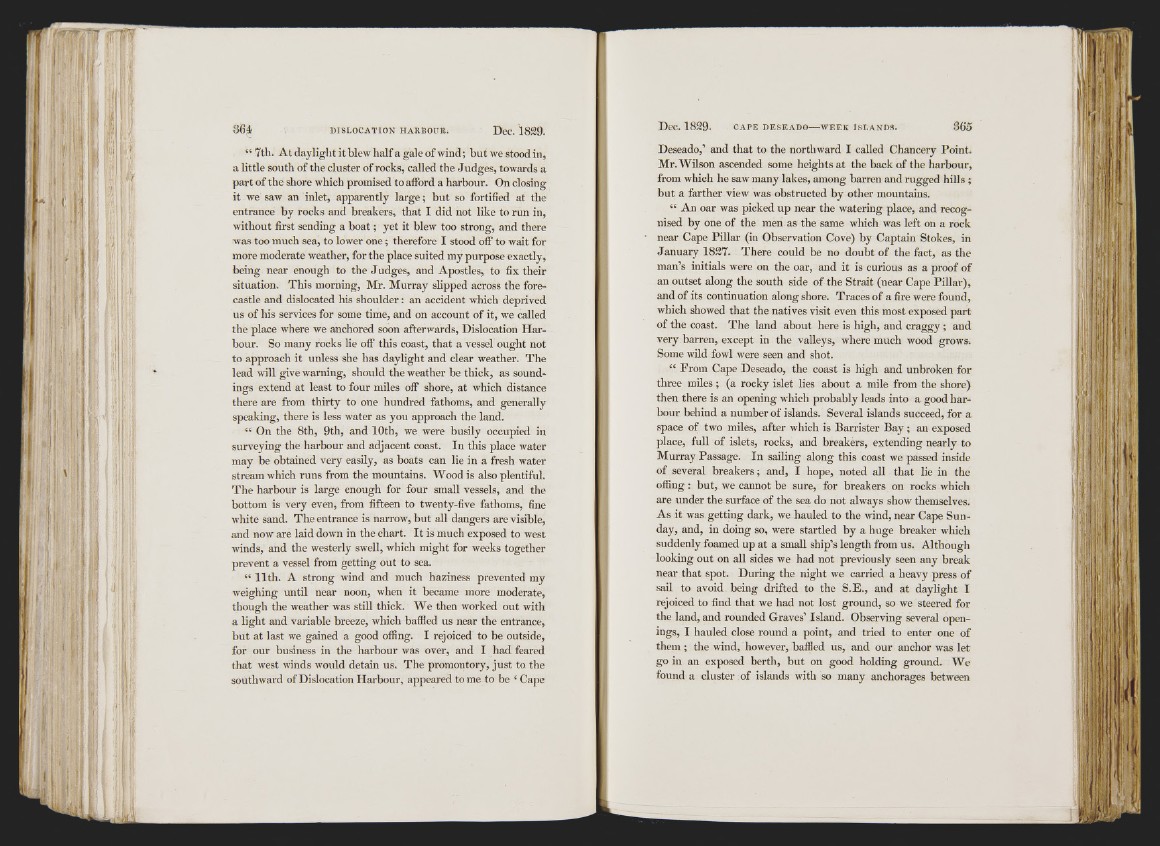
' iìT
'li I'
! i;i
\ : if '
) Í
S¡iÍi
] ’1
“ 7tli. At dayliglit it blew half a gale of wind; but we stood in,
a httle south of the cluster of rocks, called the Judges, towards a
part of the shore which promised to afford a harbour. On closing
it we saw an inlet, apparently large; but so fortified at the
entrance by rocks and breakers, that I did not like to run in,
without first sending a boat; yet it blew too strong, and there
was too much sea, to lower one; tlierefore I stood off to wait for
more moderate weather, for the place suited my purpose exactly,
being near enough to the Judges, and Apostles, to fix their
situation. This morning, Mr. Murray slipped across the forecastle
and dislocated his shoulder: an accident which deprived
us of his services for some time, and on account of it, we called
the place where we anchored soon afterwards. Dislocation Harbour.
So many rocks lie off this coast, that a vessel ought not
to approach it unless she has daylight and clear weather. The
lead will give warning, should the weather be thick, as soundings
extend at least to four miles off shore, at which distance
there are from thirty to one hundred fathoms, and generally
speaking, there is less water as you approach the land.
“ On the 8th, 9th, and 10th, we were busily occupied in
surveying the harbour and adjacent coast. In this place water
may be obtained very easily, as boats can lie in a fresh water
stream which runs from the mountains. Wood is also plentiful.
The harbour is large enough for four small vessels, and the
bottom is very even, from fifteen to twenty-five fathoms, fine
white sand. The entrance is narrow, but all dangers are visible,
and now are laid down in the chart. It is much exposed to west
winds, and the westerly swell, which might for weeks together
prevent a vessel from getting out to sea.
“ 11th. A strong wind and much haziness prevented my
weighing until near noon, when it became more moderate,
though the weather was still thick. We then worked out with
a light and variable breeze, which baffled us near the entrance,
but at last we gained a good offing. I rejoiced to be outside,
for our business in the harbour was over, and I had feared
that west winds would detain us. The promontory, just to the
southward of Dislocation Harbour, appeared to me to be ‘ Cape
M i i ' ;
I i '
1 (
Deseado,’ and that to the northward I called Chancery Point.
Mr. Wilson ascended some heights at the back of the harbour,
from which he saw many lakes, among barren and rugged hills ;
but a farther view was obstructed by other mountains.
“ An oar was picked up near the watering place, and recognised
by one of the men as the same which was left on a rock
near Cape Pillar (in Observation Cove) by Captain Stokes, in
January 1827. There could be no doulit of the fact, as the
man’s initials were on the oar, and it is curious as a proof of
an outset along the south side of the Strait (near Cape Pillar),
and of its continuation along shore. Traces of a fire were found,
which showed that the natives visit even this most exposed part
of the coast. The land about here is high, and craggy ; and
very barren, except in the valleys, where much wood grows.
Some wild fowl were seen and shot.
“ From Cape Deseado, the coast is high and unbroken for
three miles ; (a rocky islet lies about a mile from the shore)
then there is an opening which probably leads into a good harbour
behind a number of islands. Several islands succeed, for a
space of two miles, after which is Barrister B ay; an exposed
place, full of islets, rocks, and breakers, extending nearly to
Murray Passage. In sailing along this coast we passed inside
of several breakers; and, I hope, noted all that lie in the
offing: but, we cannot be sure, for breakers on rocks which
are under the surface of the sea do not always show themselves.
As it was getting dark, we hauled to the wind, near Cape Sunday,
and, in doing so, were startled by a huge breaker which
suddenly foamed up at a small ship’s length from us. Although
looking out on all sides we had not previously seen any break
near that spot. During the night we carried a heavy press of
sail to avoid being drifted to the S.E., and at daylight I
rejoiced to find that we had not lost ground, so we steered for
the land, and rounded Graves’ Island. Observing several openings,
I hauled close round a point, and tried to enter one of
them ; the wind, however, baffled us, and our anchor was let
go in an exposed berth, but on good holding ground. We
found a cluster of islands with so many anchorages between
1 t \ f
ii-
!